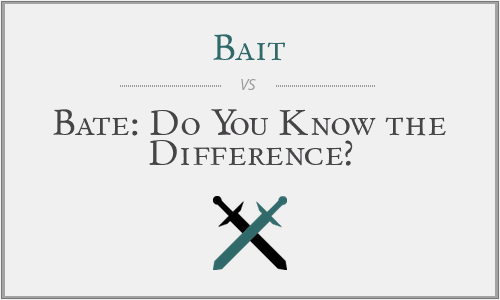
You know the expression, “…with bated/baited breath…”
What do you think? Is it spelled "bait” or “bate”? Are you sure?
The words “bait” and “bate” are homophones, which means they are pronounced the same, but their spelling and meaning is different. These two words are often used interchangeably and incorrectly.
The Word “Bait”
The word “bait” comes from the Middle English word, “bayte, beite,” from the Old Norse word “beita,” and from the Old English word “bat,” all meaning “food, something that can be bitten.” Interestingly, the word “bait” is related to the word “bite.”
As a noun:
“Bait” is the food or material that is used to trap or net an animal, or to hook a fish, sometimes containing poison or other harmful ingredients.
It can also be used to mean “a temptation, an enticement, something used to lure a victim into a certain situation.” This definition can be used metaphorically, as in “to take the bait.”
For example, “Although the prospective buyers loved the renovated kitchen, they did not take the bait.”
As a verb:
“Bait” means “to entice, to lure, or tempt.”
“Bait” can also mean “to intentionally annoy, ridicule, taunt, torment, tease, or provoke.”
The Word “Bate”
Most popularly, the word “bate” is usually used in the expression, “with bated breath,” meaning "excitedly or anxiously."
The word “bate” can be used as a verb or a noun.
As a verb:
“Bate” means the same as “abate “– “to become gradually less intense, to become more moderate, to lower, to reduce, to restrain.”
For example,
“I was unable to bate my disappointment.”
“The employer bated the employee’s benefits.”
As a noun:
“Bate” refers to the liquid in which animal skins are steeped to make them more supple. It also describes the alkaline lye which balances the effects of lime.
Final Thoughts
Now you can tell the difference between the two words “bait” and “bate.”
4. When the hawk (bated, baited) it’s wings, it flew even faster.
Answers:
1. Bated
2. Bait
3. Bate
4. Bated
5. Bait
6. Baited




Have a discussion about this article with the community:
Report Comment
We're doing our best to make sure our content is useful, accurate and safe.
If by any chance you spot an inappropriate comment while navigating through our website please use this form to let us know, and we'll take care of it shortly.
Attachment
You need to be logged in to favorite.
Log In